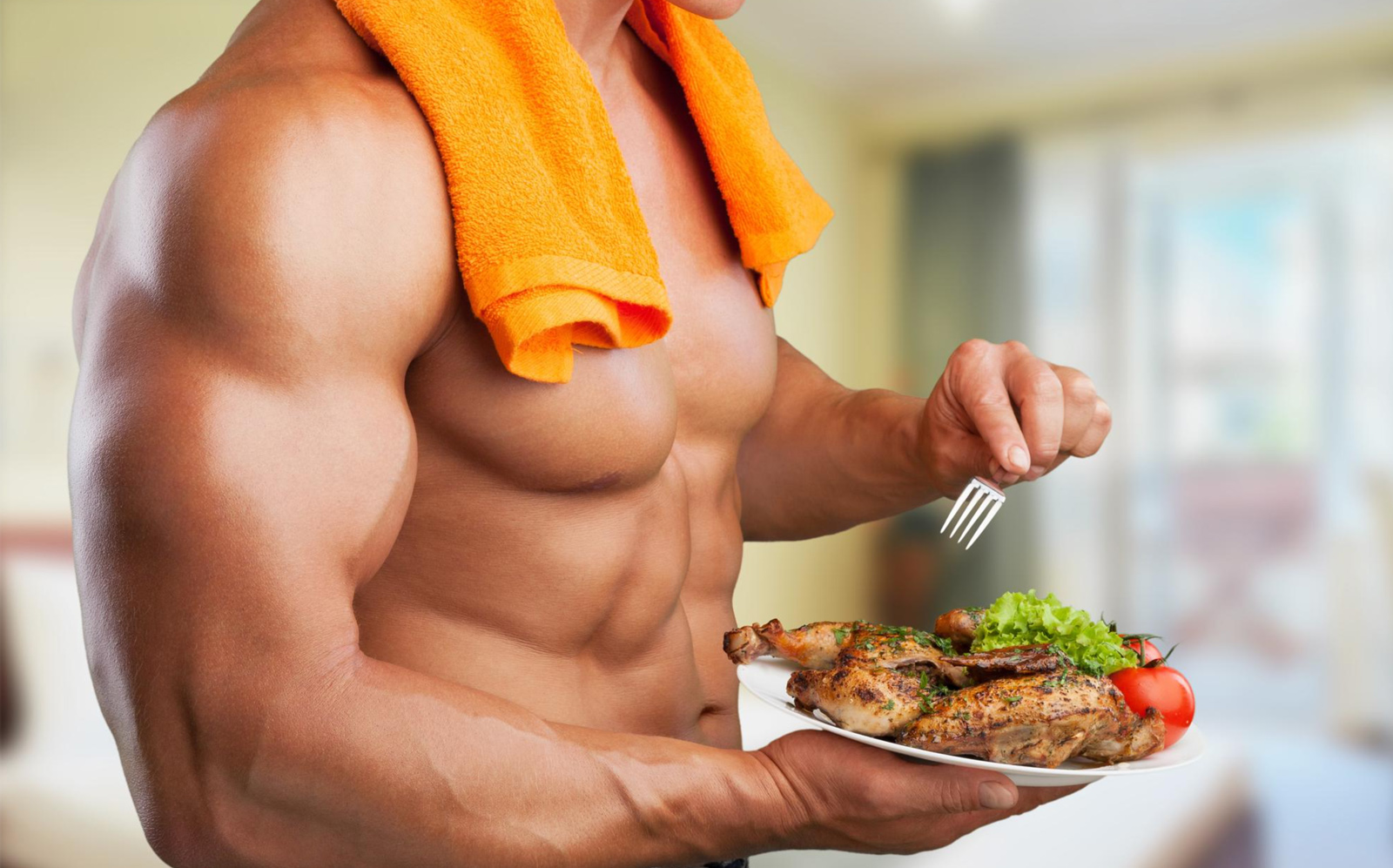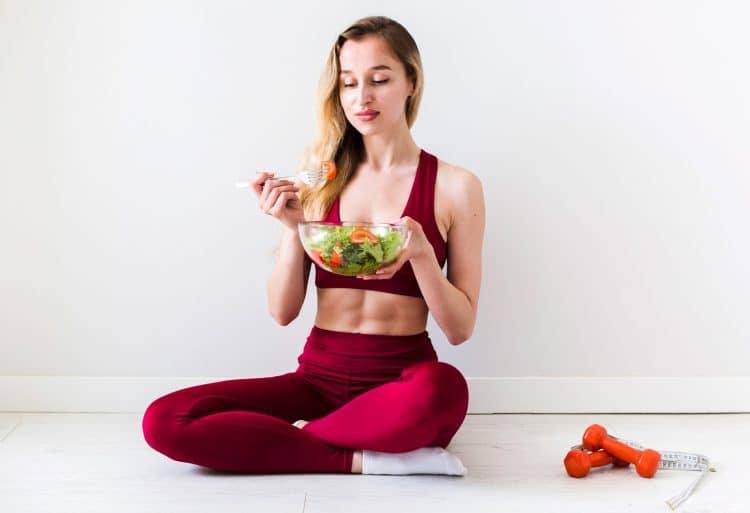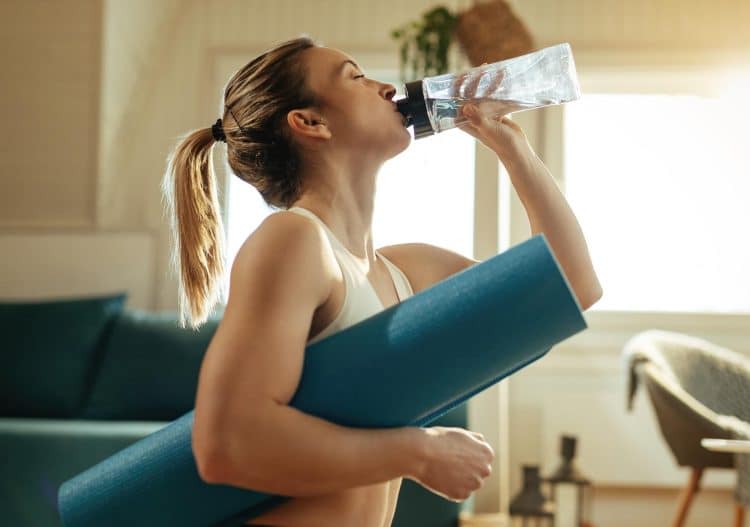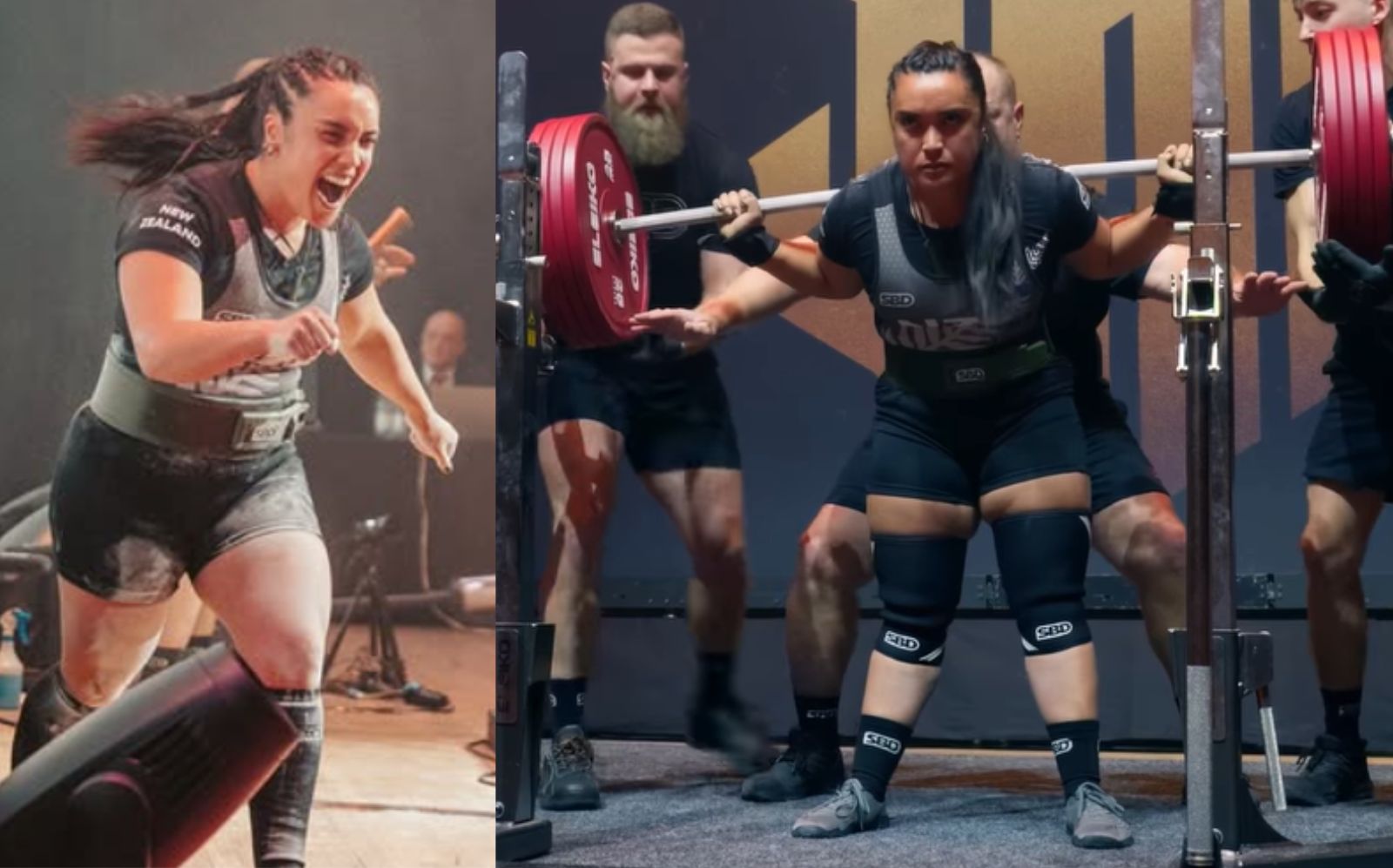Experts recommend avoiding heavy meals before workouts. Large meals slow digestion, making exercise uncomfortable. Instead, fuel your body with easily digestible carbohydrates and a small amount of protein for optimal energy.
As a personal trainer, my clients constantly ask me what, how much, and when they should eat before a training session.
A lot is said about pre-workout nutrition, and most of it can be conflicting information. I spent over 50 hours researching scientific literature and expert advice to find the optimal pre-training meal timing and size for optimal workout energy, endurance, and performance.
I share everything I’ve learned in this article.
Why Heavy Meals Can Hinder Your Workout
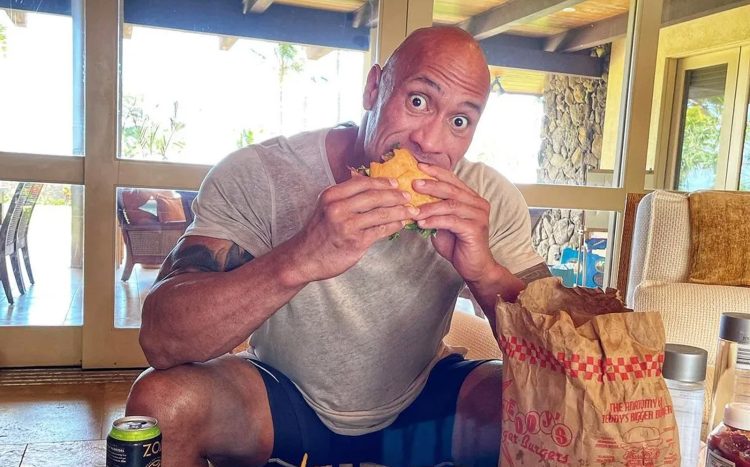
After a big meal, your body works hard to digest the food and deliver the nutrients to the muscles. During a workout, your body tries to send maximum blood, oxygen, and nutrients to the working muscles.
Eating a heavy meal before a training session makes your body work against itself. It all boils down to digestion versus performance. Push yourself too hard in the gym on a full stomach, and you might feel sluggish, bloated, and nauseous.
A mega pre-workout meal can also cause muscle cramps.
On the other hand, a well-balanced and timed meal can improve your performance by boosting focus, ensuring sustained energy levels, and enhancing recovery. (1)
What Makes a Meal ‘Heavy’?
The word “heavy” can be subjective. What is heavy for a 120-pound individual might be light to moderate for a 240-pound bodybuilder.
You must understand the intricacies of bodybuilding meal timing and nutrients to maximize your performance.
A “heavy” meal isn’t just a matter of how much food actually lands on your plate. It’s also about the types of food and how they jell with your stomach. For instance, I have clients who cannot imagine a pre-workout meal without sweet potatoes, whereas a few feel nauseous after eating it.
Here are the biggest factors that you must consider while designing your pre-workout meals:
Fat Content
High-fat foods like avocados and nuts are digested slowly and keep you feeling full for longer. Furthermore, highly processed foods like burgers can cause discomfort during a workout. Keep your fat intake to a minimum before a training session to feel light.
Fiber
Fiber is your friend, as it can help with food digestion and absorption. However, it too can make you feel full and satiated for an extended period. Even worse, it can cause bloating and gas, which is something you absolutely want to avoid during a high-intensity workout.
Portion Control
Too much of anything is bad. Eating a boatload of chicken breast or oats before a meal can also cause discomfort during a workout.
Pro Tip: Everyone’s digestion is different. A pre-workout meal that works for your training partner might feel heavy for you. Try different types and quantities of food until you find what works best for you.
Expert Advice on Pre-Workout Nutrition Timing
When you eat food, your body breaks it down into nutrients for absorption. The time it takes for your body to complete this process depends on the size of the meal. Hence, you must adjust your pre-workout meal timing depending on what you’re eating.
Jennifer McDaniel, RDN, CCSD, explains that the specifics of what, when, and how much you should eat will vary depending on the time of day, type and length of workout, and personal goals.
“If you have a low volume early workout and you are on a weight loss program, it might be best to have a glass of water but skip the food,” says McDaniel.
Adjust your meals based on whether you’ll be doing aerobic or anaerobic workouts.
“High-intensity interval workouts show lower benefits from pre-feeding,” said Rhonda Patrick (Ph.D. in Biomedical Sciences). “Pre-feeding before exercise improves long-duration aerobic exercise (longer than 60 minutes) but not shorter aerobic exercise or high-intensity interval training.”
Are fast-acting carbs worth the hype?
“Sports performance drinks, gels, and chews work great and are made from carbs that won’t cause gastrointestinal distress,” said Kate Patton, RD. “But some people prefer bananas, pretzels, or crackers.”
Let’s say you cannot train without food in your belly. In that case, what should be the best meal to boost your workout performance, and when should you have it?
“A pre-workout meal should be consumed roughly two hours before a workout and should include protein, carbs, and minimal fat. Protein should be fast-digesting and contain a high amount of leucine. Examples are whey protein and egg whites. Use high glycemic index (GI) carb sources like rice cakes, bananas, and white potatoes to boost performance. Fiber intake should be minimized to avoid feeling full during the workout,” said Jeremy Ethier.
Ethier recommends eating 20 grams of protein from egg whites and 50 grams of carbs from rice cakes and bananas before a workout.
That said, a review published in the Sports Medicine journal suggests that low GI pre-workout meals may have benefits for endurance performance compared to high GI meals. (2)
Are you into contrarian thinking? If yes, you will love what you are about to read next.
“Nutrient timing is not as important for most people as they might think,” said Dr. Mike Israetel (Ph.D. in Sport Physiology). “People who are interested in optimizing their athletic performance may need to pay more attention to nutrient timing than people who are just interested in general health or aesthetics.”
“You can still make progress even if you don’t have a pre-workout meal,” added Israetel.
Meal Timing and Size Ideas
Here are the recommended meal timings based on portion sizes:
Light Snacks: 30-60 Minutes Before Workout
I generally don’t like eating too close to a workout. However, there are days when I’m so exhausted that I cannot think about stepping inside a gym without eating something. On such days, I opt for Greek yogurt with berries or a protein shake with a handful of oats to ensure I have enough power to last through the workout. These foods are convenient, easy to digest, and sit well with my system.
Small Meals: 2-3 Hours Before Workout
According to natural bodybuilder and science-based fitness content creator Jeff Nippard, “Pre-workout nutrition is more important for leaner people, people with lower total calories, and people who do higher volume bodybuilding style training.”
Nippard recommends the following macro in a pre-training meal:
- 1 gram of carbohydrate per kilogram of body weight
- 0.5 grams of protein per kilogram of body weight
- 0 to 20 grams of fat, depending on how close the meal is to the workout
Examples of pre-workout meals include:
- Bowl of protein oatmeal with banana, peanut butter, and cinnamon
- Salmon, sweet potato, mixed green salad with goat cheese, apple slices with cinnamon
Big Meals: 3-4 Hours Before Exercise
This is mainly for people who train in the afternoon or evening. Consider these big meals your breakfast or lunch. These can include all three macronutrients in line with your daily macro targets. Eating three to four hours before a workout gives your body enough time to metabolize the fats.
I recommend my clients go for a walk after each big meal. This fires up your metabolic rate and helps with digestion.
A comparative study published in the International Journal of Sports Nutrition found that consuming a moderately high carbohydrate, low-fat, low-protein meal three hours before exercise improved performance (time to exhaustion) compared to a similar meal six hours prior. (3)
Try alternating among the three eating windows described above to find what works best for you. Pay close attention to how your body responds to the different meal timings. Also, feel free to switch the food sources.
What to Do If You Only Have Time for a Quick Snack
Let’s be real: No matter how meticulously planned your meals are, life will throw a curveball at you at some point. Sometimes, even after a big meal, you might be starving before a workout. However, this doesn’t mean you have to go through the workout in the power-saving mode.
Eating a small snack 30 to 60 minutes before a training session can make a big difference in your performance.
Here are a few quick snacks you can have before a workout:
- Fruit and nut butter
- Energy bars
- Rice cakes with toppings
- Greek yogurt and berries
- Homemade trail mix
Hydration is Key
Water is often the missing piece in peoples’ pre-training nutrition.
The human body is 70 percent water. Not drinking enough water throughout the day and before a training session can lower the supply of blood, oxygen, and nutrients to the muscle cells, which can hamper your performance. Plus, a lack of water hampers digestion, and the food sits in your stomach for longer, making you feel bloated and heavy.
Water is also key to ensuring muscle pumps during a resistance training session.
You must drink at least a gallon of water daily to avoid the risk of dehydration and all the side effects that come with it, like electrolyte imbalance, cramps, nausea, and dizziness.
Here is how much water you should be drinking to supercharge your workout performance:
- Pre-Workout: Drink 16-20 ounces of water two to three hours before your workouts and another eight to 12 ounces within 30 minutes of starting training.
- Intra-Workout: Aim to drink seven to 10 ounces of water for every 10 to 20 minutes of training.
- Recovery: Replenish lost fluids by drinking 16 to 24 ounces of water.
Feel free to add electrolytes or BCAA supplements to your water if you find drinking plain water challenging.
Conclusion
You should absolutely avoid heavy meals before a training session. The right pre-training meal will differ for each individual depending on their training goals, objectives, and preferences. Work with a trained professional to develop a meal that sits well into your overall diet plan and delivers enough energy and nutrients to maximize your training performance and recovery.
If you have any questions about pre-workout meals, drop them in the comments below, and I’ll be happy to help!
References
Fitness Volt is committed to providing our readers with science-based information. We use only credible and peer-reviewed sources to support the information we share in our articles.
- Hawley, J. A., & Burke, L. M. (1997). Effect of meal frequency and timing on physical performance. The British journal of nutrition, 77 Suppl 1, S91–S103. https://doi.org/10.1079/bjn19970107
- Burdon, C. A., Spronk, I., Cheng, H. L., & O’Connor, H. T. (2017). Effect of Glycemic Index of a Pre-exercise Meal on Endurance Exercise Performance: A Systematic Review and Meta-analysis. Sports medicine (Auckland, N.Z.), 47(6), 1087–1101. https://doi.org/10.1007/s40279-016-0632-8
- Maffucci, D. M., & McMurray, R. G. (2000). Towards optimizing the timing of the pre-exercise meal. International journal of sport nutrition and exercise metabolism, 10(2), 103–113. https://doi.org/10.1123/ijsnem.10.2.103


